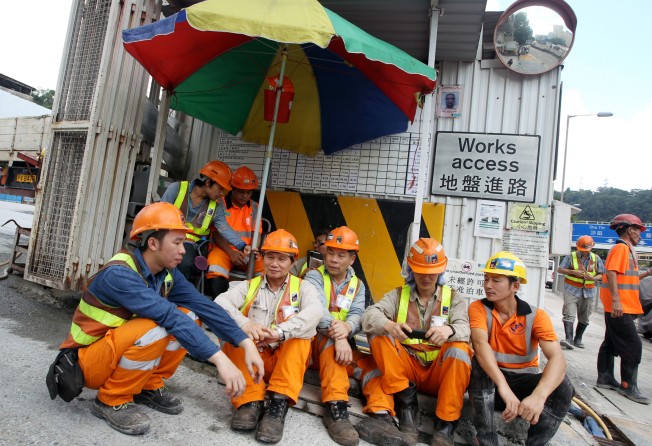'Don't believe news of labour shortage': Trade unions slam plans to import builders
MTR criticised in particular for planning to hire from overseas despite a growing pool of unemployed local construction workers

Trade unions claim reports of a local labour shortage was fake, as they lashed out at the MTR Corporation’s plan to hire foreign labour for an express rail project.
The Confederation of Trade Unions (HKCTU) said employers and the government were inventing a labour shortage in the construction industry as a “smokescreen” to import labour and push down wages in the market.
The unions argue that companies can easily hire from the pool of unemployed local construction workers. They added that those locals with jobs had seen their wages cut.
“We have more than 80 per cent turnover in some areas of our industry,” said Construction Site Workers General Union vice-chairman Chung Ling-so.
“The Construction Industry Council is supposed to provide us with young workers with the right skills, but many of their [educational] courses are wrong and the industry cannot absorb them.”
“The government is spreading this false information of a labour shortage. It is a smokescreen,” he said.
The confederation’s organising secretary Fan Cheung-fung criticised the MTR Corporation in particular. “They want to import workers for their own profit at the expense of the livelihood of local workers,” he said.
The HKCTU did not provide statistics.
In November, MTR said it needed 2,000 more workers to help make sure the HK$67 billion Guangzhou-Shenzhen-Hong Kong Express Rail Link could be completed by next year.
“The figures are not convincing. They are just using excuses and false signs to cheat us,” said Fan, adding that most construction was already past the peak season and importing more labour would only create oversupply and drag down wages.
“The MTR Corporation can’t explain why their contractors of main infrastructure projects are in such a shortage and how much labour they actually need,” Fan said.
Maggie So Man-kit, MTR’s deputy general manager for projects, said the company would only hire foreign labour through the Supplementary Labour Scheme if its manpower needs are not met.
The Supplementary Labour Scheme allows employers with “genuine difficulties” finding suitable local staff to import workers at technician level or below.
She said they would work closely with contractors to attract new workers through job fairs and advertising.
MTR will hit a peak season for labour demand by the summer in which at least 18,000 workers would be needed, So said.
“We estimate there will be a shortage of 5,000 workers in areas such as civil, electrical, mechanical engineers …Other areas of shortage include tunnel engineers, electricians and workers for track-laying and demolitions.”
On Sunday, labour and welfare secretary Matthew Cheung Kin-chung said the bureau would consult the Labour Advisory Council this week on how to relax the vetting procedures of the Supplementary Labour Scheme for public works construction projects.
He said the construction industry was facing a dire shortage labour but any labour import plans must follow the “three principles” of not affecting local workers’ employment, wages and benefits.
Imported workers accounted for only 0.1 per cent of the city’s total labour force, compared with 26 per cent in Macau and 28 per cent in Singapore.